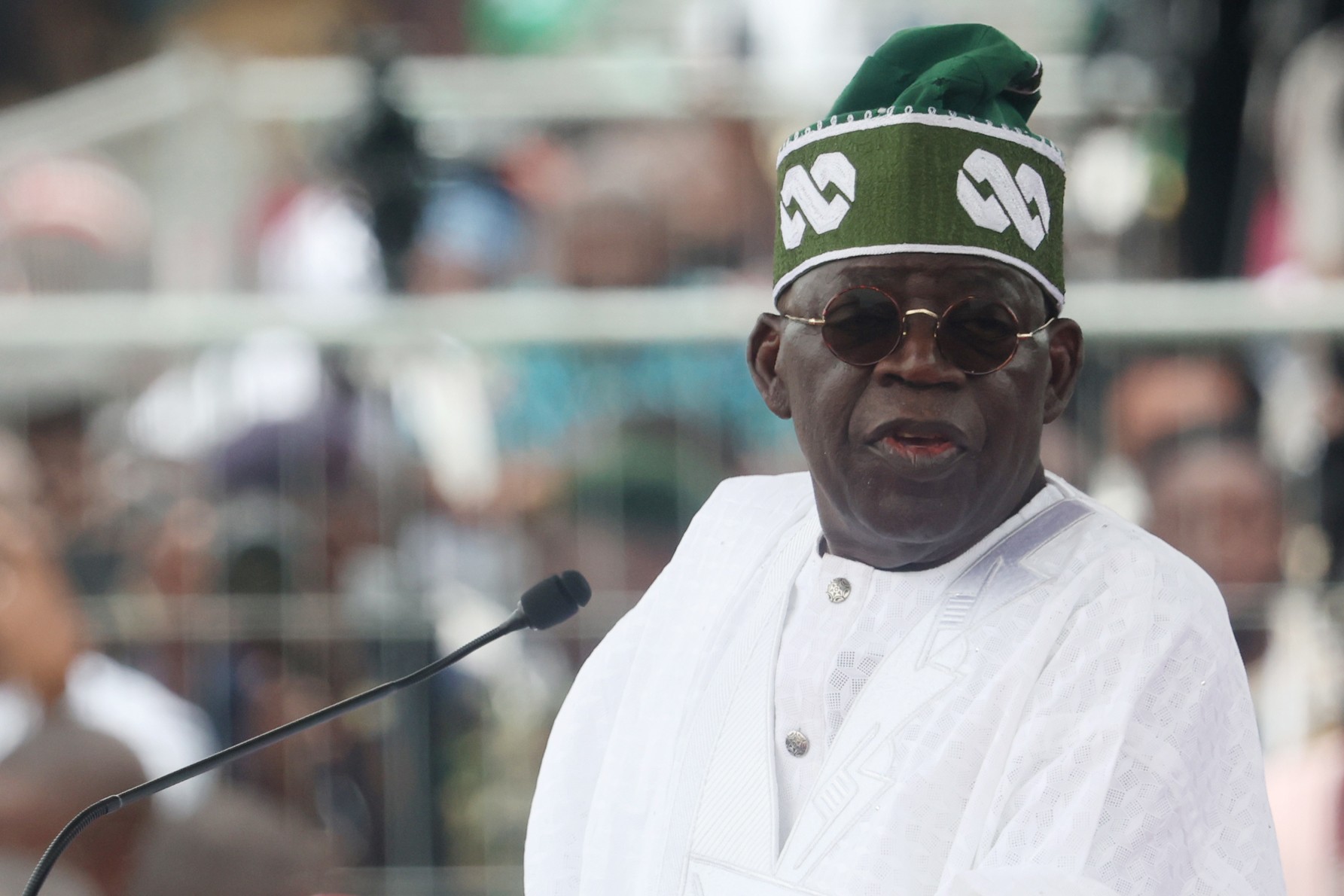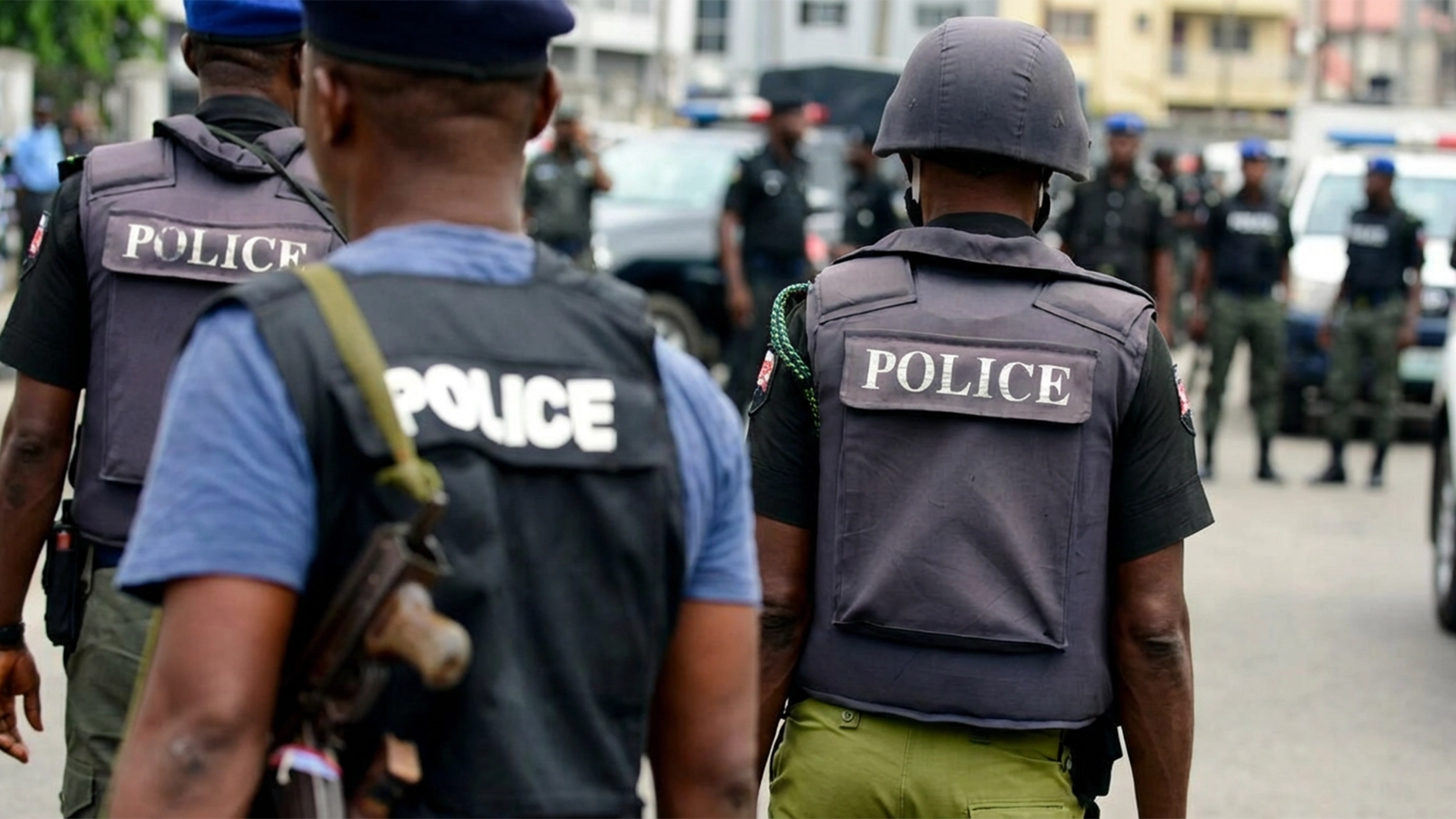
The 71-year-old succeeds 80-year-old former army general Muhammadu Buhari of the same party, who stepped down after two terms in office, leaving a country facing a sea of economic troubles and security challenges. (Photo by KOLA SULAIMON / AFP)
President Bola Tinubu’s tough talk on the anti-corruption campaign is not new in the wordsmith enterprise. But beyond another empty threat, to him belongs that rare opportunity to make the best of a bad lot – if he is really willing. As one of those former governors that have been most fingered for sleaze, he holds a vantage position to change the narrative about his disposition to corrupt practices, and help Nigeria to a new beginning. It begins with housecleaning of his political empire, and a firm stance against those angling to test his resolve on malfeasance.
In another tone akin to his predecessors in office, Tinubu promised to kill corruption, describing it as one of the main goals of his administration. He rightly solicited for the cooperation of all Nigerians to achieve this lofty ideal. According to him, “My own is not identity politics. It’s not hunger or poverty politics. I have followed a man who has integrity, character and courage to say ‘Nigerians we need to change and change we have to. Change our mindset, kill corruption in our society.”
We applaud the President’s resolve to ‘kill corruption,’ though a pledge we have heard several times, especially in the last eight years. His successor, former president Muhammadu Buhari made the same pledge in 2015 before he was elected. Their party, the All Progressives Congress (APC) made a singsong of their capacity to kill corruption. One of them said: ‘If Nigeria doesn’t kill corruption, corruption will kill Nigeria.’’ Buhari was touted to be a man of integrity, and Nigerians were promised that under his watch, corruption would become a thing of the past.
However, we have witnessed under him a brazen display of financial recklessness, lack of transparency and accountability. We witnessed the classic case of Abdulrasheed Maina, former chairman of the defunct Pension Reform Task Team (PRTT). Maina was accused of corruption in 2012, after which he was sacked from the Civil Service in 2013. He went into hiding after the Economic and Financial Crimes Commission began to look into the books. In 2017 Maina resurfaced as acting director, Human Resources in the Interior Ministry.
There is also the mind-boggling case of former Accountant General of the Federation, Ahmed Idris, who is now standing trial along with other defendants over a hefty N109 billion fraud perpetrated under the gaze of Buhari – Mr Integrity. During COVID-19, Buhari curiously announced that the school feeding programme would continue despite the lockdown. The result was that N2.67 billion was stolen in the name of feeding children in Federal schools at a time when there was no school in the country.
That apart, fuel subsidy bill, which Buhari condemned during campaign as a conduit for siphoning public money, has increased in volume. In the 2023 budget, a whopping sum of N3.36 trillion is allocated for fuel subsidy bills for the first six months of the year. The same administration freed convicted governors that are serving jail terms to go and enjoy the loot. Buhari’s government didn’t fight corruption, it only glamourised it.
So, killing corruption under Tinubu’s watch cannot be achieved by mere pledges and platitudes. To fight and kill corruption in the country, the task must begin with a determination by the President, the first family, appointed cabinet ministers as well as governors, their wives and cabinet members to live above board, like Caesar’s wife. They must not create room for undue scrutiny by opening their acts to taxpayers’ knowledge. It begins with the institution of transparency and accountability at every level of governance.
The Presidency should show personal example and be accountable on all matters including private details of travels, health status and public declaration of assets. On this, we emphasize public declaration, as it is not enough to do secret declarations that citizens cannot verify. The body language of Mr President is very important here. He has to set the tone for others to follow. The late President Umaru Yar’Adua is on record to have set an example on this. Subsequently, former president Buhari and his Vice, Prof. Yemi Osinbajo provided sketchy details of their assets in 2015.
In 2020, when the Socio-Economic Rights and Accountability Project (SERAP) demanded full disclosure, a presidential spokesperson in a tenuous reply said no law compels Buhari to make public his assets declaration. This is where the Freedom of Information Act comes in. The FoI law as signed by former president Goodluck Jonathan in May 2011, allows public records and information to be freely accessible by citizens, to the extent that is consistent with public interest.
For accountability and transparency in public office, and to make the Code of Conduct for Public Officers succeed in taming, if not killing corruption, the Fifth Schedule of the 1999 constitution must be revisited and reworked. The Code of Conduct Bureau (CCB) should be invigorated to look into details of conflict of interest, prohibition of foreign accounts, receiving gifts or benefits as provided in the Schedule. These infractions, which the Schedule frowns at, are serially violated by public officers with the law unable to bite. The law should be made to bite harder. The CCB should be empowered to go beyond being a mere receiver of written declaration of assets to carrying out independent investigations.
Appointments to the Code of Conduct Tribunal (CCT) should be rejiggered to allow for prompt monitoring and supervision. The present system whereby the President appoints members based on recommendation by the National Judicial Council (NJC) looks tight, but lax on monitoring. The CCT operates under Civil Service rules with all its excesses.
To also be decisive in killing corruption, all anti-graft agencies must be stripped of their allegiances to political parties and politicians. The present arrangement whereby the chairman of the EFCC reports to the office of the Attorney General and Minister of Justice does not serve the course of justice – the AG being a politically exposed person and an interested party in some corruption matters. The EFCC and all anti-graft bodies should be made more independent.
The president should also exorcise the evil notion that his party, the APC is a haven and safe habitat for corrupt politicians. A former chairman of the party, Adams Oshiomhole, once gleefully invited politicians with corruption baggage to join the party, and their sins will be forgiven. Indeed, many politicians with corruption charges have joined APC from the Peoples Democratic Party (PDP) and they have become ranking members. That is certainly not the way to kill corruption. Let APC purge itself of corruption to make it easy for Tinubu to kill the malaise.
There are enough anti-corruption laws and instruments in place to build a culture of anti-corruption in the public space. However, they need to be operationalised and sustained. For instance, the Public Procurement Act (PPA), the Fiscal Responsibility Act (FRA) and the Financial Regulations Act (FRA) were enacted to compel Ministries, Departments and Agencies (MDA) to enthrone accountability and transparency. The trouble is in the full implementation of the laws because the political leadership has not demonstrated the political will to kill corruption.
For Tinubu, he has a date with history, to take Nigeria through the labyrinth to a corruption-free public service and society at large. As one who carries a baggage of corruption allegations, history beckons him to prove that he is the man destined to clean the Augean stable.
The challenge is not for him alone, but for all of us. The time has come for all, religious bodies, civil society, the Judiciary and all anti-corruption agencies to join in the fight to kill corruption!
President Tinubu, ‘kill’ corruption from within

Nigeria's President Bola Tinubu delivers his speech after taking oath of office during his inauguration at the Eagle Square in Abuja, Nigeria on May 29, 2023. - Nigeria's new president Bola Tinubu, sworn in on May 29, 2023, has promised to unite Africa's most populous nation and tackle insecurity as "top priority". The 71-year-old succeeds 80-year-old former army general Muhammadu Buhari of the same party, who stepped down after two terms in office, leaving a country facing a sea of economic troubles and security challenges. (Photo by KOLA SULAIMON / AFP)





